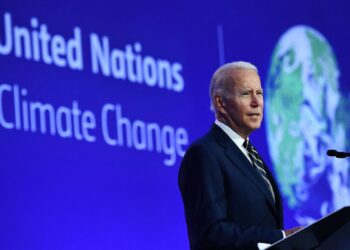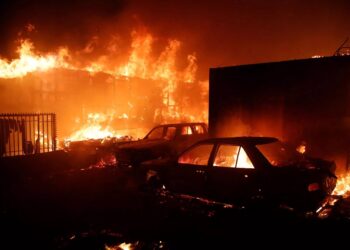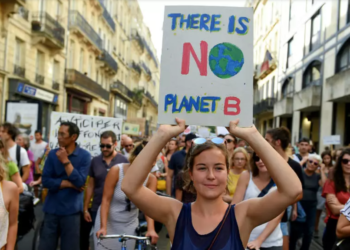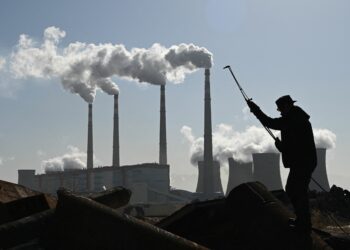Paris on Tuesday will host the “One Planet” climate finance summit, a last-minute gathering of business leaders, heads of state and civil society groups to discuss the future of a “green economy.” In the lead-up to the summit, however, conflicting interests have risen to the surface as new reports pointed out heavy Euoprean investment in fossil fuel infrastructure.
The One Planet meeting will take place exactly two years after the historic Paris climate agreement and was co-organized by French President Emmanuel Macron, World Bank President Jim Yong Kim and U.N. Secretary-General Antonio Guterres.
Although not an official U.N. conference, the summit is expected to gather many country delegations and heads of state, as well as representatives from business, industry and civil society.
Lauded by many as an additional call for climate ambition led by the French government, the inclusion of businesses and industries at the Paris discussions – many of which have investments in fossil fuel infrastructure – has raised concerns on how impartial these talks will be.
Conflict of Interest at Climate Talks
According to UNFCCC, the official U.N. body leading climate negotiations, climate finance is critical in addressing climate change because large-scale investments are required to reduce emissions and to make a systematic transformation to a more sustainable future.
The One Planet summit aims to keep the discussion on climate finance going, albeit outside of the official U.N. circuit and with mainly non-state actors at the table, including energy corporations.
A recently published report by the U.S.-based thinktank Corporate Accountability found that energy industries are some of the most powerful lobbyists at climate talks, such as the U.N. climate negotiations that took place in Bonn, Germany, last November.
“Big Polluters like oil, gas, coal, and agricultural transnational corporations (TNCs) are not only the largest emitters; their climate denial, lobbying, and policy interference make these industries one of the primary obstacles to sound climate policy at the local, national, and international levels,” stated the report, entitled “Polluting Paris.”
“For almost as long as the UNFCCC has existed, the same industries whose profits depend on the burning of oil, coal, and gas have been permitted to bankroll the UN climate talks,” the report said.
Although the inclusion of non-sate actors is absolutely necessary when shaping a just and sustainable transition, giving a voice to companies and institutions with large investments in fossil fuels during climate negotiations – whether they are official ones like in Germany last November or informal ones like in Paris this December – causes a conflict of interest on a scale that affects us all.
“This has long been a contentious issue because it allows some of the corporations to write checks or provide services such as cars for official delegates, to build the negotiating halls where world leaders gather to address climate change, or even to sit at the very tables where climate policy is being decided,” CA media director Jesse Bragg said.
European Development Bank Invests Billions in Fossil Fuels
Jean-Yves Le Drian, French Minister of European and International Affairs and one of the co-chairs of the One Planet Summit, has said that financial resources are required to allow countries to “adapt to the adverse effects and reduce [the] impacts of climate change.”
Nonetheless, a new report by the monitor Bankwatch shows how billions of dollars are still being invested in fossil fuels under the guise of development aid.
The European Bank for Reconstruction and Development, a multilateral development bank formed by 65 countries including the U.S. and China, and the fifth largest in the world, awarded $4.4 billion (€3.73) for fossil fuel projects between 2010 and 2016, which is more than double its support for renewable energy during the same period. This is despite the bank’s claims that it is addressing the climate crisis.
According to Bankwatch’s analysis, fossil fuel projects accounted for the largest share, 41 percent, of the EBRD’s $11.7 billion energy and natural resources portfolio over the six-year period.
A previous Bankwatch report warned that though the EBRD had made commendable strides in its support for energy efficiency and renewable energy in the five years prior, $3.84 billion – nearly half of the bank’s energy lending – went to fossil fuel projects. Commendably, the bank effectively brought investments in new coal power to a full stop the next year.
Although the bank effectively halted all investments in new coal power by 2013, Bankwatch’s new study found that after several years of increased renewable energy investments, the bank has relapsed in 2016, and is now investing less in renewable energy and more in fossil fuels.
Over the past five years, the development bank has spent on average half a billion a year on fossil fuel investments, with $900 million spends on fossil fuels in 2016 alone.
In 2017 this figure could be even higher, as the bank approved a $500 million loan to Azerbaijan last October for the realization of the Trans Anatolian gas pipeline, a deal that is said to fuel corruption, human rights abuse and climate change impacts in the region.
Fidanka Bacheva-McGrath, a policy pfficer at the CEE Bankwatch Network, stated:
“The EBRD has been a trail blazer in renewables development, and it has made a strategic commitment to direct 40 percent of its investments to the green economy transition in our countries by 2020. That is exactly why it is so disappointing to see that the bank’s fossil fuel investments are on the rise, including coal-heavy utilities and gas pipelines.”
“Even more disconcerting is that the EBRD counts some of its investments in fossil fuels as climate action. Such financial support for fossil fuels then translates into a moral support for an industry that is dragging our countries away from a sustainable low-carbon development path.”
The United States is the largest financer of the EBRD. Most of the Development Bank’s fossil fuels investments occur in the E.U., central Asia, Eastern Europe and the Caucasus.






















